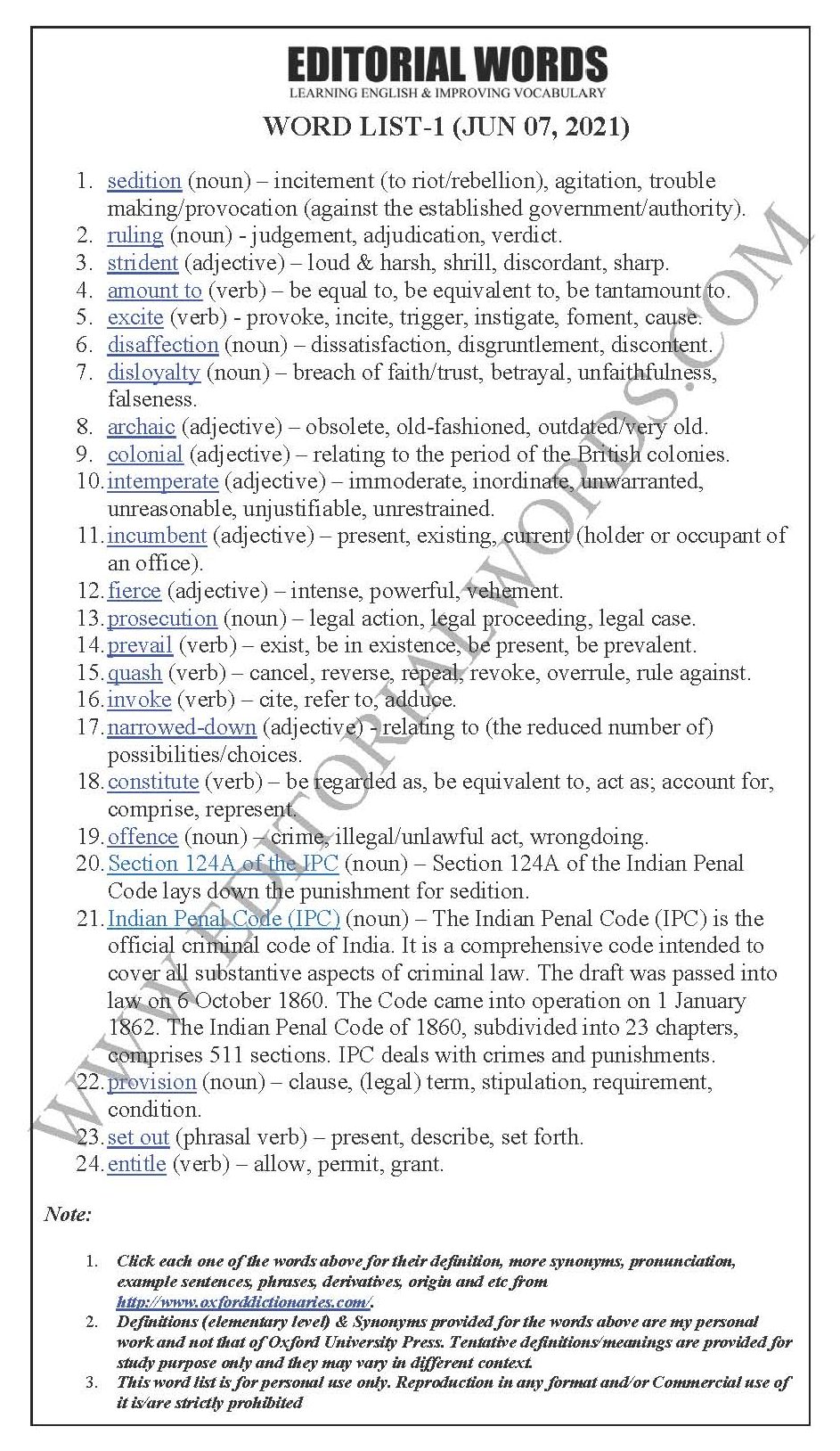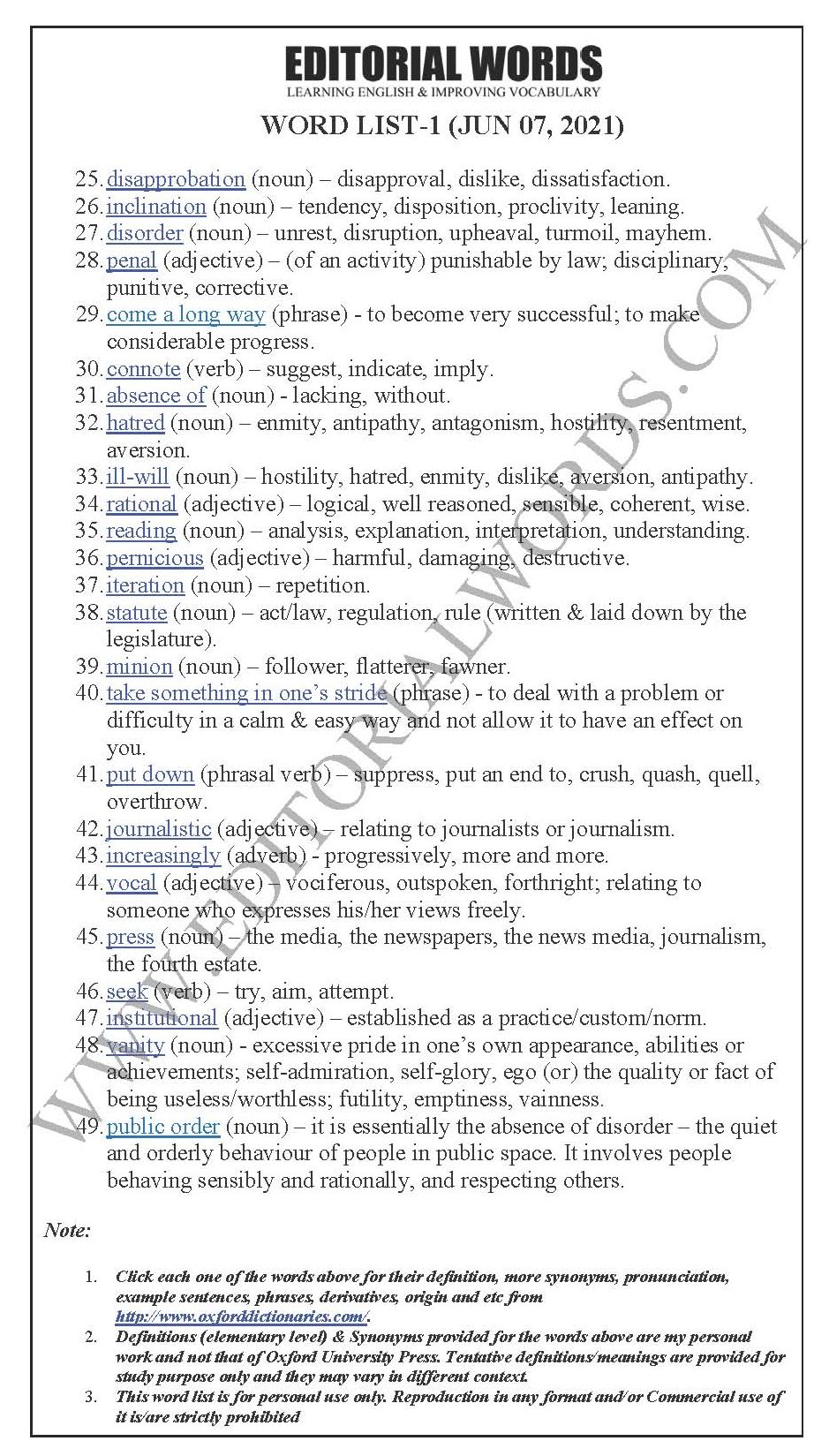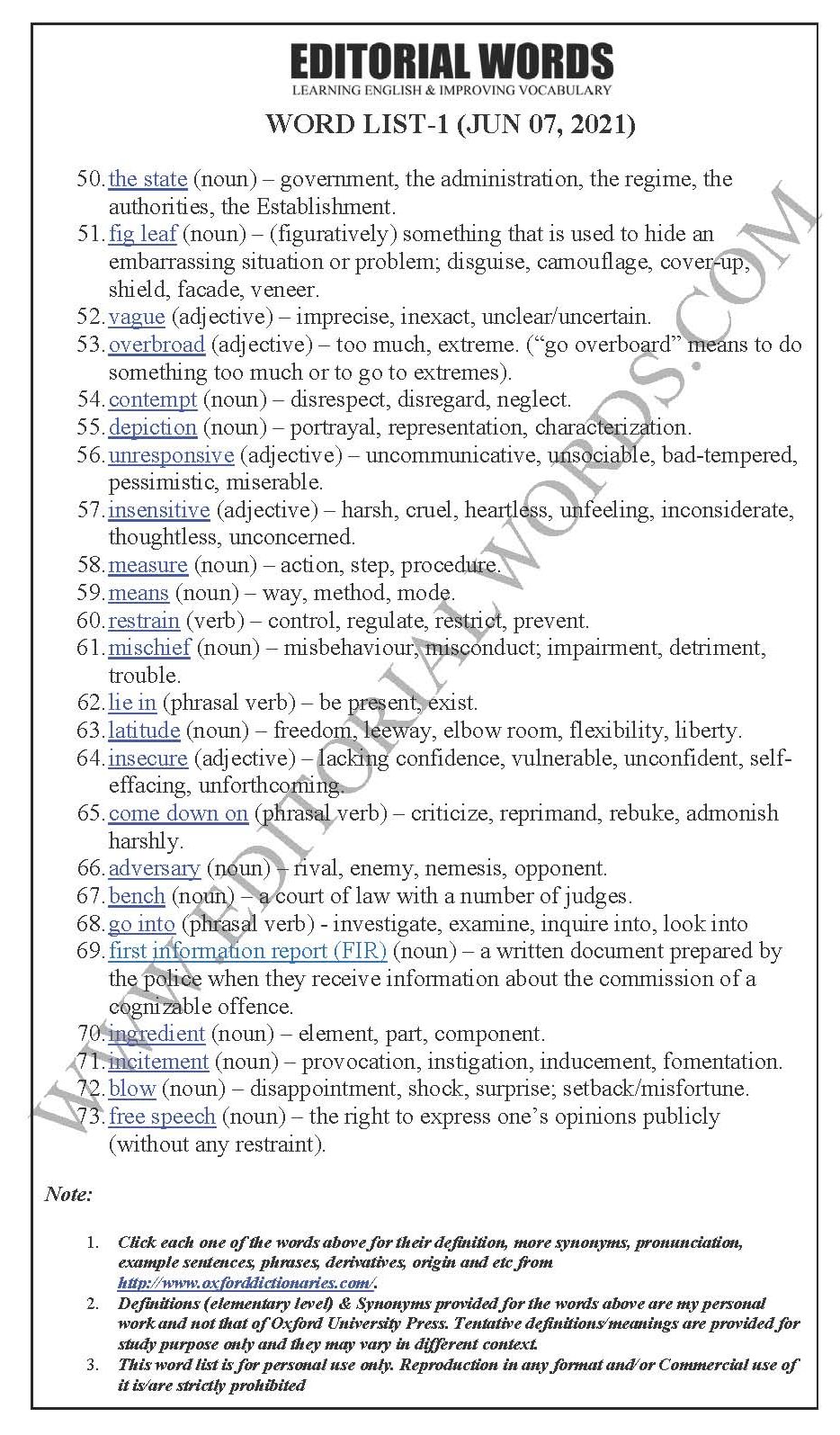The Hindu Editorial (Media and sedition) – Jun 07, 2021
It has long been recognised that strident criticism of government will not amount to an attempt to excite disaffection and disloyalty towards government. For further reading, visit “The Hindu”. Below is today’s word list-1 for The Hindu Editorial (Media and sedition) – Jun 07, 2021.
To read this article, click here.
This preview is provided here with permission.
Courtesy: The Hindu
The Hindu Editorial (Media and sedition) – Jun 07, 2021:
- sedition (noun) – incitement (to riot/rebellion), agitation, trouble making/provocation (against the established government/authority).
- ruling (noun) – judgement, adjudication, verdict.
- strident (adjective) – loud & harsh, shrill, discordant, sharp.
- amount to (verb) – be equal to, be equivalent to, be tantamount to.
- excite (verb) – provoke, incite, trigger, instigate, foment, cause.
- disaffection (noun) – dissatisfaction, disgruntlement, discontent.
- disloyalty (noun) – breach of faith/trust, betrayal, unfaithfulness, falseness.
- archaic (adjective) – obsolete, old-fashioned, outdated/very old.
- colonial (adjective) – relating to the period of the British colonies.
- intemperate (adjective) – immoderate, inordinate, unwarranted, unreasonable, unjustifiable, unrestrained.
- incumbent (adjective) – present, existing, current (holder or occupant of an office).
- fierce (adjective) – intense, powerful, vehement.
- prosecution (noun) – legal action, legal proceeding, legal case.
- prevail (verb) – exist, be in existence, be present, be prevalent.
- quash (verb) – cancel, reverse, repeal, revoke, overrule, rule against.
- invoke (verb) – cite, refer to, adduce.
- narrowed-down (adjective) – relating to (the reduced number of) possibilities/choices.
- constitute (verb) – be regarded as, be equivalent to, act as; account for, comprise, represent.
- offence (noun) – crime, illegal/unlawful act, wrongdoing.
- Section 124A of the IPC (noun) – Section 124A of the Indian Penal Code lays down the punishment for sedition.
- Indian Penal Code (IPC) (noun) – The Indian Penal Code (IPC) is the official criminal code of India. It is a comprehensive code intended to cover all substantive aspects of criminal law. The draft was passed into law on 6 October 1860. The Code came into operation on 1 January 1862. The Indian Penal Code of 1860, subdivided into 23 chapters, comprises 511 sections. IPC deals with crimes and punishments.
- provision (noun) – clause, (legal) term, stipulation, requirement, condition.
- set out (phrasal verb) – present, describe, set forth.
- entitle (verb) – allow, permit, grant.
- disapprobation (noun) – disapproval, dislike, dissatisfaction.
- inclination (noun) – tendency, disposition, proclivity, leaning.
- disorder (noun) – unrest, disruption, upheaval, turmoil, mayhem.
- penal (adjective) – (of an activity) punishable by law; disciplinary, punitive, corrective.
- come a long way (phrase) – to become very successful; to make considerable progress.
- connote (verb) – suggest, indicate, imply.
- absence of (noun) – lacking, without.
- hatred (noun) – enmity, antipathy, antagonism, hostility, resentment, aversion.
- ill-will (noun) – hostility, hatred, enmity, dislike, aversion, antipathy.
- rational (adjective) – logical, well reasoned, sensible, coherent, wise.
- reading (noun) – analysis, explanation, interpretation, understanding.
- pernicious (adjective) – harmful, damaging, destructive.
- iteration (noun) – repetition.
- statute (noun) – act/law, regulation, rule (written & laid down by the legislature).
- minion (noun) – follower, flatterer, fawner.
- take something in one’s stride (phrase) – to deal with a problem or difficulty in a calm & easy way and not allow it to have an effect on you.
- put down (phrasal verb) – suppress, put an end to, crush, quash, quell, overthrow.
- journalistic (adjective) – relating to journalists or journalism.
- increasingly (adverb) – progressively, more and more.
- vocal (adjective) – vociferous, outspoken, forthright; relating to someone who expresses his/her views freely.
- press (noun) – the media, the newspapers, the news media, journalism, the fourth estate.
- seek (verb) – try, aim, attempt.
- institutional (adjective) – established as a practice/custom/norm.
- vanity (noun) – excessive pride in one’s own appearance, abilities or achievements; self-admiration, self-glory, ego (or) the quality or fact of being useless/worthless; futility, emptiness, vainness.
- public order (noun) – it is essentially the absence of disorder – the quiet and orderly behaviour of people in public space. It involves people behaving sensibly and rationally, and respecting others.
- the state (noun) – government, the administration, the regime, the authorities, the Establishment.
- fig leaf (noun) – (figuratively) something that is used to hide an embarrassing situation or problem; disguise, camouflage, cover-up, shield, facade, veneer.
- vague (adjective) – imprecise, inexact, unclear/uncertain.
- overbroad (adjective) – too much, extreme. (“go overboard” means to do something too much or to go to extremes).
- contempt (noun) – disrespect, disregard, neglect.
- depiction (noun) – portrayal, representation, characterization.
- unresponsive (adjective) – uncommunicative, unsociable, bad-tempered, pessimistic, miserable.
- insensitive (adjective) – harsh, cruel, heartless, unfeeling, inconsiderate, thoughtless, unconcerned.
- measure (noun) – action, step, procedure.
- means (noun) – way, method, mode.
- restrain (verb) – control, regulate, restrict, prevent.
- mischief (noun) – misbehaviour, misconduct; impairment, detriment, trouble.
- lie in (phrasal verb) – be present, exist.
- latitude (noun) – freedom, leeway, elbow room, flexibility, liberty.
- insecure (adjective) – lacking confidence, vulnerable, unconfident, self-effacing, unforthcoming.
- come down on (phrasal verb) – criticize, reprimand, rebuke, admonish harshly.
- adversary (noun) – rival, enemy, nemesis, opponent.
- bench (noun) – a court of law with a number of judges.
- go into (phrasal verb) – investigate, examine, inquire into, look into
- first information report (FIR) (noun) – a written document prepared by the police when they receive information about the commission of a cognizable offence.
- ingredient (noun) – element, part, component.
- incitement (noun) – provocation, instigation, inducement, fomentation.
- blow (noun) – disappointment, shock, surprise; setback/misfortune.
- free speech (noun) – the right to express one’s opinions publicly (without any restraint).
Note:
1. Click each one of the words above for their definition, more synonyms, pronunciation, example sentences, phrases, derivatives, origin and etc from http://www.oxforddictionaries.com/.
2. Definitions (elementary level) & Synonyms provided for the words above are my personal work and not that of Oxford University Press. Tentative definitions/meanings are provided for study purpose only and they may vary in a different context.
3. This word list is for personal use only. Reproduction in any format and/or Commercial use of it is/are strictly prohibited.
The Hindu Editorial (Media and sedition) – Jun 07, 2021:



“Phrasal Verbs” We Learnt Last Week
“Idioms & Phrases” We Learnt Last Week
“Important Definitions” We Learnt Last Week
Recent Word Lists For The Hindu Editorial Articles

Be the first to comment